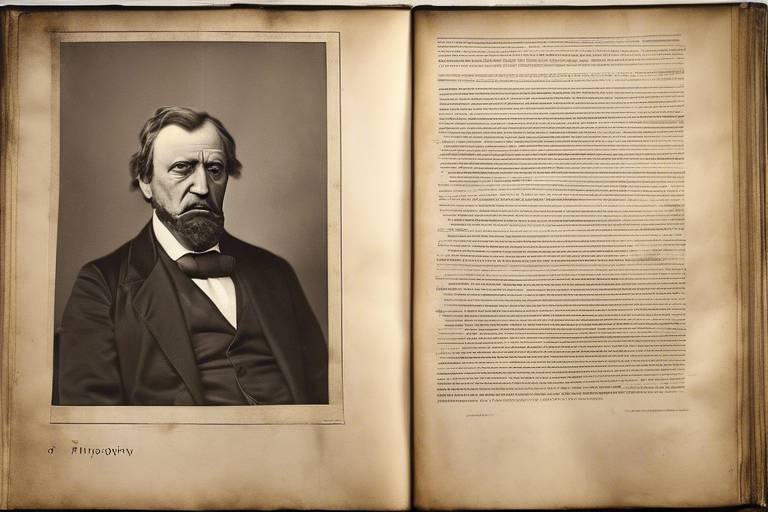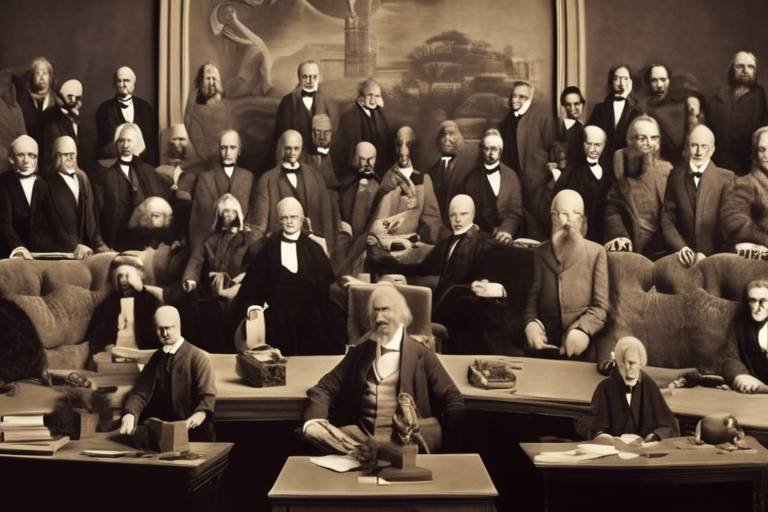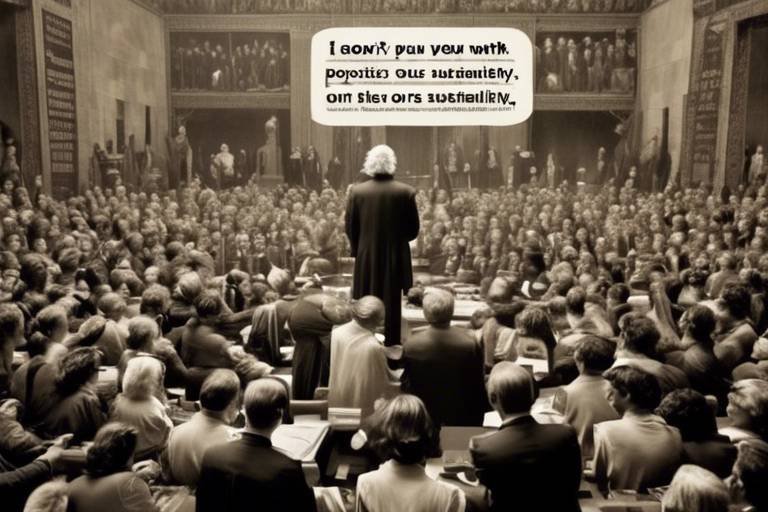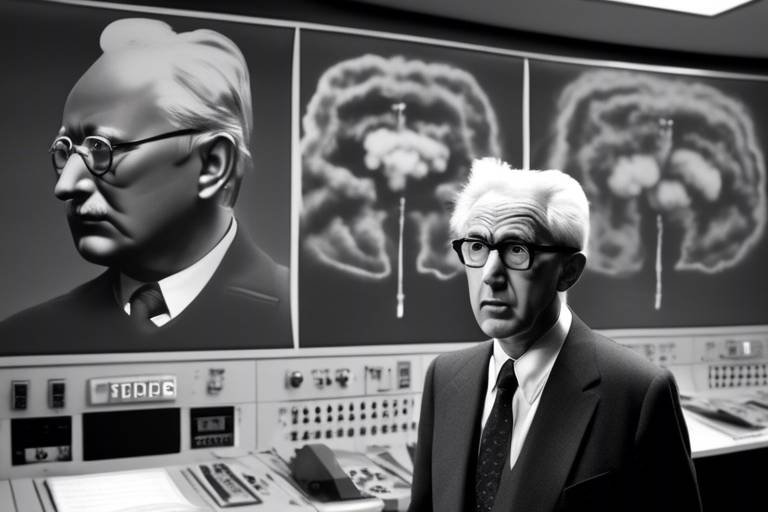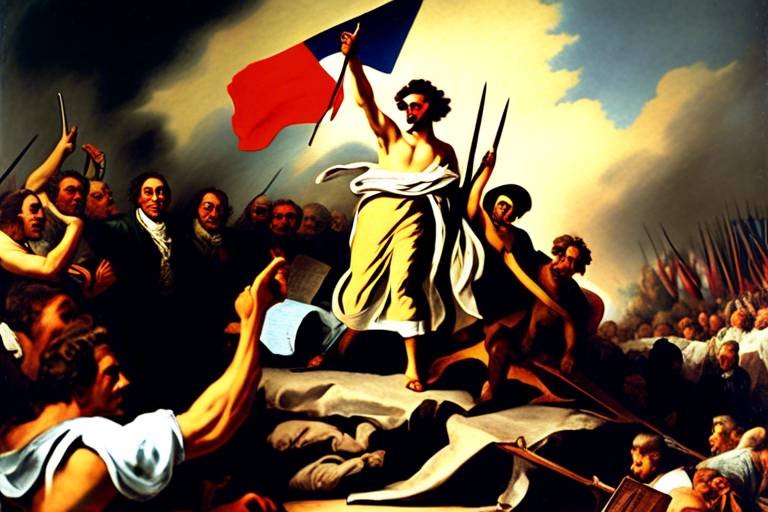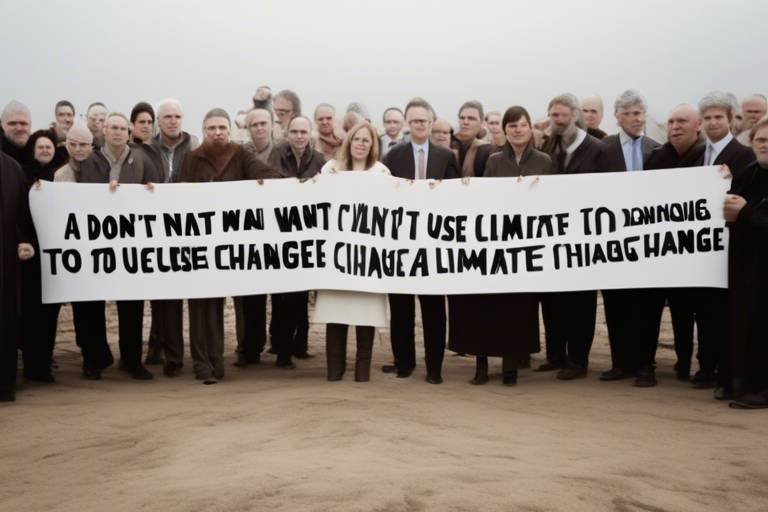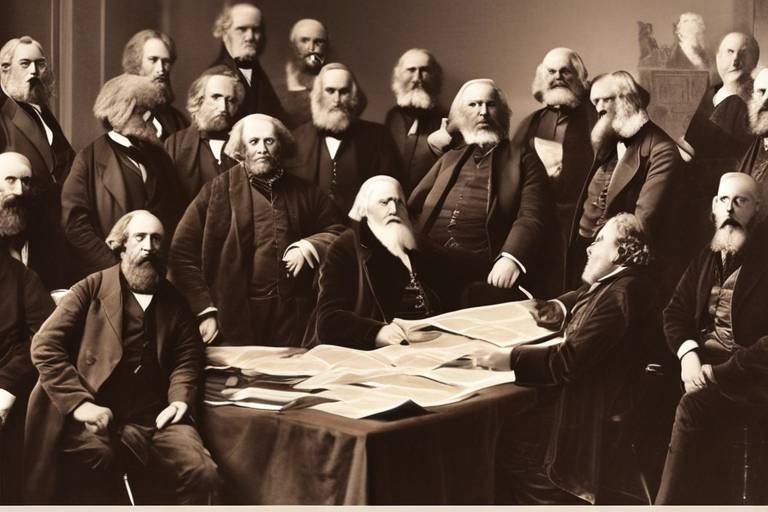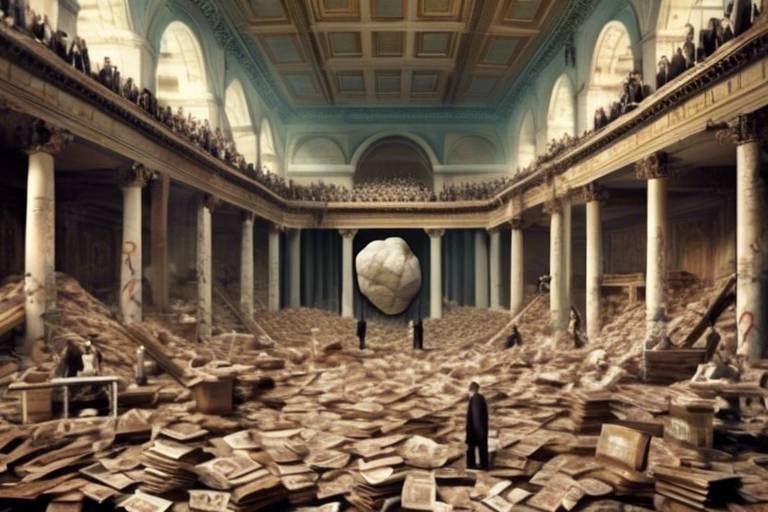The Philosophy of History: Understanding Political Transitions
This article explores the philosophical underpinnings of historical narratives, examining how political transitions shape societies and influence future governance through various philosophical lenses. History is not merely a series of events; it is a complex tapestry woven with the threads of human experience, ideology, and societal change. By delving into the philosophy of history, we can uncover the deeper meanings behind political transitions and understand how they resonate through time.
Historical change is a multifaceted phenomenon that reflects the intricate interplay of various factors. It’s like a grand symphony, where each instrument contributes to the overall harmony. At its core, historical change is driven by a combination of social, economic, and political forces. These forces can include technological advancements, shifts in cultural values, economic crises, and even the whims of influential leaders. Understanding the nature of historical change requires us to embrace its complexity and acknowledge that it is rarely linear. Instead, it often resembles a winding road, full of unexpected turns and detours.
When we explore the philosophical theories that seek to explain historical events, we encounter a rich tapestry of ideas. Among the most significant are determinism, idealism, and materialism. Each of these theories provides a unique lens through which we can interpret the evolution of political systems and societies. Determinism suggests that historical events are predetermined by a series of causal factors, while idealism emphasizes the role of human thought and ideology in shaping history. On the other hand, materialism focuses on the economic structures and class relations that underpin political changes. Each theory offers valuable insights, allowing us to piece together the puzzle of our past and its implications for the future.
Throughout history, certain individuals have emerged as pivotal figures, whose actions and ideologies have catalyzed significant political changes. These leaders often embody the hopes and aspirations of their societies, acting as catalysts for transformation. Think of figures like Mahatma Gandhi or Martin Luther King Jr., who, through their unwavering commitment to justice and equality, inspired movements that reshaped nations. However, while their contributions are undeniable, it is essential to recognize that they did not act in isolation. Their successes were often buoyed by the collective actions of ordinary people who rallied around their visions.
Analyzing specific case studies of leaders who have shaped political landscapes reveals the qualities that enable them to effect change during pivotal moments. These leaders often possess a blend of charisma, vision, and resilience. For instance, consider Nelson Mandela, whose leadership during South Africa's transition from apartheid to democracy exemplifies the power of heroic leadership. His ability to unite diverse groups and foster reconciliation highlights the importance of empathy and understanding in political transitions.
While the contributions of great individuals are significant, it is crucial to critique the limitations of attributing historical change solely to them. This perspective, often referred to as the "Great Man Theory," overlooks the importance of social movements and collective action. History is not just the story of individuals; it is also the story of communities, struggles, and the relentless pursuit of justice. By acknowledging the contributions of social movements, we gain a more nuanced understanding of how political transitions occur and the myriad forces that drive them.
Historical materialism offers another lens through which to examine the principles governing political change. This theory posits that economic structures and class relations are fundamental in shaping historical events. By analyzing how economic conditions influence political power dynamics, we can better understand the motivations behind revolutions, reforms, and policy changes. For instance, the rise of industrial capitalism brought about significant shifts in class relations, ultimately leading to political upheaval and the emergence of new ideologies.
One of the most fascinating aspects of history is its cyclical nature. Just as the seasons change, so too do political landscapes rise and fall. By examining patterns of political rise and decline, we can glean valuable lessons for contemporary governance. History teaches us that empires are often born from innovation and ambition, yet they can also succumb to complacency and corruption. Understanding these cycles can help modern leaders anticipate challenges and navigate the complexities of governance with greater foresight.
Throughout history, empires have risen to great heights, only to fall into decline. Factors contributing to this phenomenon include economic instability, military overreach, and social unrest. For example, the Roman Empire, once a beacon of civilization, eventually crumbled under the weight of internal strife and external pressures. By studying these historical empires, we can draw parallels to contemporary political structures and identify potential pitfalls that may threaten their stability.
Understanding historical cycles equips us with a framework for anticipating future political transitions. As we navigate the complexities of modern governance, it is essential to recognize that history is not merely a record of the past; it is a guide for the future. By learning from the successes and failures of those who came before us, we can make informed decisions that resonate with the needs and aspirations of our societies. The lessons of history are not just echoes of the past; they are blueprints for building a better tomorrow.
- What is the philosophy of history? The philosophy of history examines the underlying principles and ideas that shape our understanding of historical events and their significance.
- How do political transitions impact society? Political transitions can lead to significant changes in governance, social structures, and cultural values, influencing the direction of society as a whole.
- What are some key theories of historical change? Important theories include determinism, idealism, and materialism, each providing different perspectives on the factors that drive historical events.
- Can individual leaders shape history? Yes, influential leaders can catalyze significant changes, but it is essential to consider the role of collective action and social movements in driving political transitions.
- How can we learn from historical cycles? By studying patterns of rise and fall in history, contemporary leaders can anticipate challenges and make more informed decisions for the future.

The Nature of Historical Change
The concept of historical change is as intricate as a tapestry woven with countless threads, each representing different events, ideas, and social movements. At its core, historical change embodies the dynamic evolution of societies, cultures, and political systems over time. But what really drives this transformation? Is it the actions of a few influential figures, or is it the collective will of the masses? Understanding the nature of historical change requires us to peel back the layers and explore the myriad factors that contribute to political transitions.
One of the most striking characteristics of historical change is its non-linear progression. Unlike a straight line, history often resembles a winding path, filled with unexpected turns and detours. Political transitions can be triggered by a multitude of factors, including economic crises, social upheavals, and technological advancements. For instance, the Industrial Revolution not only transformed economies but also reshaped societal structures, leading to new forms of governance and social relations. The interplay of these elements creates a complex web that influences how societies evolve.
Moreover, historical change is often marked by contradictions and conflicts. As societies strive for progress, they frequently encounter resistance from established norms and institutions. This tension can lead to revolutionary movements or gradual reforms, each with its own set of consequences. Take, for example, the civil rights movement in the United States. It was not merely a response to racial injustice but also a reflection of broader societal shifts towards equality and human rights. This illustrates how historical change can be both a reaction to existing conditions and a catalyst for new ideologies.
In addition to these complexities, the context in which historical events unfold plays a crucial role. The same event can be perceived differently depending on cultural, social, and political contexts. For instance, the French Revolution is viewed as a fight for liberty and equality in some narratives, while in others, it is seen as a period of chaos and bloodshed. This subjectivity highlights the importance of perspective in understanding historical change.
Furthermore, we must consider the impact of technology on historical transitions. Throughout history, technological advancements have often acted as a double-edged sword, facilitating progress while also creating new challenges. The advent of the internet, for example, has revolutionized how we communicate and access information, but it has also raised questions about privacy, security, and the spread of misinformation. These technological shifts can lead to significant political changes, as seen in the Arab Spring, where social media played a pivotal role in mobilizing protests and challenging authoritarian regimes.
Ultimately, the nature of historical change is a multifaceted phenomenon shaped by a convergence of factors. It is essential to recognize that while individuals and events can catalyze change, they do not operate in isolation. The broader social, economic, and technological landscape significantly influences the trajectory of political transitions. By understanding these dynamics, we can gain valuable insights into the past and better navigate the complexities of our present and future.
- What are the primary factors that drive historical change? Historical change is driven by a combination of social movements, economic conditions, technological advancements, and cultural shifts.
- How does context influence our understanding of historical events? Context shapes the interpretation of events, as the same occurrence can be viewed differently based on cultural and societal norms.
- Can technology impact political transitions? Yes, technological advancements can facilitate political change by altering communication methods and mobilizing social movements.
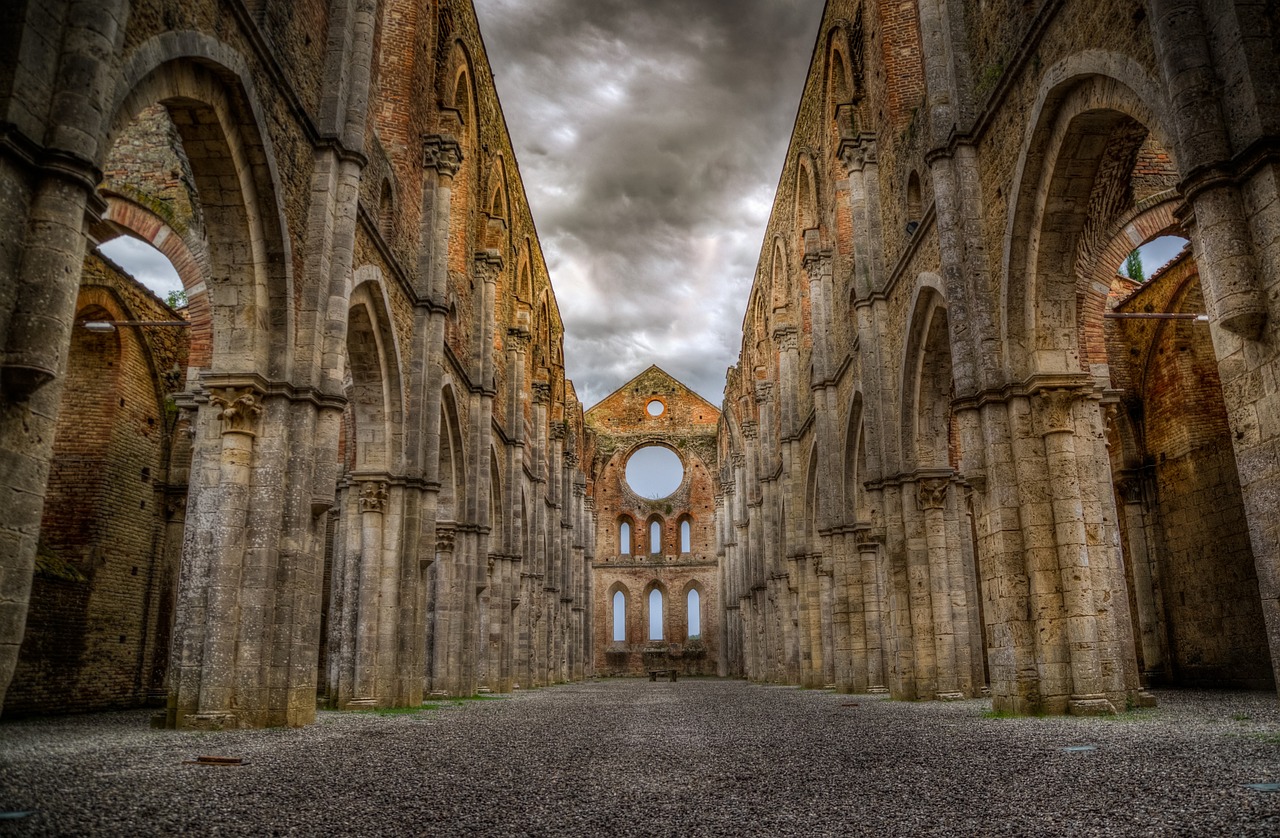
The study of history is not just about dates and events; it is a complex tapestry woven from various philosophical theories that seek to explain why things happen the way they do. At its core, the philosophy of history attempts to understand the underlying forces that shape societies and their political landscapes. There are several key philosophical theories that provide different lenses through which we can interpret historical events. These include determinism, idealism, and materialism. Each of these theories offers a unique perspective on the driving forces behind political transitions and societal changes.
Determinism posits that history is shaped by pre-existing conditions and inevitable forces. Think of it like a river flowing in a certain direction; no matter how hard you try to divert it, it will ultimately follow its natural course. This view suggests that human agency is limited, and that the outcomes of historical events are largely predetermined by factors such as geography, climate, and economic conditions. Proponents of determinism argue that understanding these factors is crucial for comprehending why societies evolve in specific ways.
On the other hand, idealism emphasizes the role of ideas, beliefs, and human consciousness in shaping history. This perspective suggests that great ideas can inspire movements and revolutions, much like a spark igniting a fire. Idealists believe that the thoughts and philosophies of influential figures can create a ripple effect, leading to significant political changes. For example, the Enlightenment thinkers like Rousseau and Locke championed ideas of liberty and democracy, which paved the way for revolutions that reshaped nations.
Then we have historical materialism, a theory that focuses on the material conditions of life—primarily economic factors—as the driving force behind historical change. This perspective argues that the economic base of society, including class relations and production methods, ultimately shapes its political and ideological superstructure. Historical materialism posits that to understand political transitions, one must examine the underlying economic realities that influence social relations. It’s like looking at the roots of a tree; if you want to understand how it grows, you need to see what’s happening underground.
These philosophical theories do not exist in isolation; they often intersect and influence one another. For instance, while historical materialism emphasizes economic factors, it does not completely dismiss the role of ideas and individual actions. The interplay between these theories can provide a more nuanced understanding of historical events. For example, the rise of socialism in the 19th century can be analyzed through the lens of historical materialism, while also recognizing the impact of ideological leaders like Karl Marx, who inspired collective movements.
Understanding these philosophical theories is essential for anyone looking to grasp the complexities of historical change. They offer a framework for analyzing past events and can help us anticipate future political transitions. By examining the interplay of determinism, idealism, and materialism, we can gain deeper insights into how societies evolve and what factors contribute to political stability or upheaval.
- What is the main focus of philosophical theories of history?
The main focus is to understand the underlying forces that shape historical events, including economic, ideological, and individual factors. - How do determinism and idealism differ?
Determinism emphasizes pre-existing conditions and inevitable forces, while idealism focuses on the impact of ideas and beliefs on historical change. - Can historical materialism coexist with other theories?
Yes, historical materialism can intersect with other theories, providing a more comprehensive understanding of historical events.

The Role of Great Individuals
When we delve into the annals of history, we often encounter towering figures whose actions seem to echo through time, shaping the very fabric of society. These individuals, whether they are revolutionary leaders, visionary thinkers, or charismatic politicians, possess an undeniable influence over the political landscape. But what is it that allows these great individuals to effect such profound change? Is it their inherent qualities, or is it the circumstances that elevate them to prominence?
One of the most compelling aspects of great individuals in history is their ability to act as catalysts for change. They often emerge during times of turmoil or transition, when societies are ripe for transformation. For example, figures like Nelson Mandela and Martin Luther King Jr. not only advocated for justice but also inspired millions to join their cause. Their charisma and unwavering commitment to their ideals galvanized social movements that reshaped entire nations. It's as if these leaders possess a unique alchemy that turns the discontent of the masses into a powerful force for change.
However, attributing historical change solely to these individuals can be misleading. While their contributions are significant, they often stand on the shoulders of broader social movements and collective actions. For instance, the civil rights movement in the United States was not just about Martin Luther King Jr.; it involved countless activists, organizations, and ordinary citizens who rallied for equality. Thus, while great individuals can ignite a spark, it is the collective energy of society that truly fuels the fire of change.
To better understand the impact of great individuals, we can consider a few key attributes that often define them:
- Visionary Thinking: Great individuals often possess a clear vision of what they want to achieve, allowing them to inspire others.
- Resilience: The path to change is fraught with obstacles, and these leaders demonstrate remarkable perseverance in the face of adversity.
- Charisma: Their ability to connect with people on a personal level enables them to rally support and mobilize action.
- Strategic Acumen: Great individuals often exhibit a keen understanding of political dynamics, allowing them to navigate complex situations effectively.
Moreover, the legacy of these great individuals can be observed in the long-term transformations they inspire. For instance, the reforms initiated by leaders like Winston Churchill during World War II not only altered the course of the war but also set the stage for post-war reconstruction in Europe. Their actions resonate beyond their lifetimes, influencing future generations and shaping the political ideologies that govern societies.
In conclusion, while great individuals undeniably play a pivotal role in political transitions, it is essential to recognize the interplay between individual agency and collective action. History is not merely a series of events dictated by a few extraordinary people; it is a complex tapestry woven from the threads of countless lives, experiences, and movements. As we reflect on the past, we must appreciate both the extraordinary leaders who rise to the occasion and the collective spirit that empowers change.
Q1: How do great individuals impact historical events?
A1: Great individuals often act as catalysts for change, inspiring and mobilizing others to join movements that can reshape societies.
Q2: Can historical change occur without great individuals?
A2: Yes, while great individuals can influence change, many historical transitions result from collective action and broader social movements.
Q3: What qualities define a great leader in history?
A3: Visionary thinking, resilience, charisma, and strategic acumen are often key qualities that define great leaders.

Heroic Leadership in Political Transitions
When we think about political transitions, it’s hard to ignore the impact of heroic leaders. These are the individuals who, through their charisma, vision, and sometimes sheer willpower, have the ability to steer the course of history. They often emerge during times of crisis, providing not just direction but also hope to their followers. Think of figures like Nelson Mandela, who, after spending decades in prison, emerged to lead South Africa away from apartheid. His journey wasn’t just about personal triumph; it was a beacon of change for an entire nation. But what exactly makes these leaders so pivotal?
One of the defining characteristics of heroic leaders is their ability to inspire collective action. They often have a unique way of articulating the struggles and aspirations of the people, galvanizing them toward a common goal. This is not merely about being a good orator; it’s about resonating with the emotional and psychological fabric of society. For instance, consider Martin Luther King Jr. and his famous "I Have a Dream" speech. His words transcended mere rhetoric, igniting a movement that challenged deep-seated societal norms.
However, it’s essential to recognize that the effectiveness of heroic leadership is not solely about the individual. It is equally about the context in which they operate. A leader can possess all the charisma in the world, but without a receptive environment and a collective desire for change, their impact may be limited. This leads us to the idea that while heroic leaders can catalyze change, they often do so in tandem with broader social movements. This interplay is crucial in understanding the dynamics of political transitions.
Furthermore, we can analyze the qualities that define these heroic figures. They often possess a mix of vision, resilience, and empathy. Vision allows them to see beyond the current state of affairs and articulate a better future. Resilience helps them navigate the inevitable challenges and setbacks they face, while empathy enables them to connect with the struggles of the people they lead. These attributes can often be seen in leaders who have faced adversity but emerged stronger, like Mahatma Gandhi, who led India to independence through nonviolent resistance, embodying the spirit of resilience.
Despite their significant contributions, we must also critique the notion of the "great man" in history. While heroic leaders play a critical role, attributing all change to them can overshadow the importance of collective movements and societal changes. It’s essential to recognize that while these individuals can lead, they are often supported by a multitude of voices advocating for change. This collective action can be just as powerful, if not more so, than the actions of a single leader.
In conclusion, heroic leadership in political transitions is a complex interplay of individual qualities and societal dynamics. These leaders can inspire and mobilize, but they do so within the context of broader movements. As we reflect on the past, it becomes clear that understanding this relationship is crucial for comprehending how political landscapes evolve and how we can anticipate future transitions.
- What is the role of heroic leaders in political transitions?
Heroic leaders inspire and mobilize people during times of crisis, often providing a vision for change that resonates with the collective aspirations of society. - Are all political changes attributed to heroic leaders?
No, while heroic leaders can catalyze change, many transitions are also the result of collective action and social movements. - Can you give examples of heroic leaders?
Examples include Nelson Mandela, Martin Luther King Jr., and Mahatma Gandhi, who all played pivotal roles in significant political transitions.

Critiques of Great Man Theory
The Great Man Theory posits that history is primarily shaped by the actions and decisions of extraordinary individuals, often overshadowing the broader social, economic, and cultural contexts in which they operate. While it's tempting to attribute monumental shifts in political landscapes solely to these larger-than-life figures, this perspective has faced significant critique over the years. One of the primary arguments against the Great Man Theory is that it simplifies the complex tapestry of history into a narrative that glorifies individualism at the expense of collective action.
For instance, consider the American Civil Rights Movement. While leaders like Martin Luther King Jr. and Rosa Parks are often celebrated as pivotal figures, their success was deeply intertwined with grassroots organizations and the collective efforts of countless individuals who fought for justice and equality. This raises an important question: can we truly understand the impact of these leaders without acknowledging the broader movements that supported them?
Furthermore, critics argue that the Great Man Theory tends to ignore the influence of structural forces such as economic conditions, social norms, and political institutions. These factors often play a crucial role in shaping the environment in which these leaders operate. For example, the rise of the labor movement in the early 20th century was not merely the result of charismatic leaders but was also a response to industrialization, economic disparity, and the struggles of the working class. By focusing solely on the actions of individuals, we risk overlooking the underlying issues that drive historical change.
Additionally, the Great Man Theory can perpetuate a narrow view of history that prioritizes the experiences of those in power while marginalizing the voices of the oppressed. This selective storytelling can lead to a distorted understanding of historical events. A more nuanced approach recognizes that history is made by both leaders and the masses, and that significant change often arises from the interplay between individual agency and collective action.
To illustrate this critique further, let's consider a table that compares the Great Man Theory with a more collective approach to understanding history:
| Aspect | Great Man Theory | Collective Action Perspective |
|---|---|---|
| Focus | Individual leaders and their actions | Groups, movements, and social contexts |
| Historical Change | Driven by exceptional individuals | Emerges from collective struggles and societal shifts |
| Representation | Often overlooks marginalized voices | Includes diverse perspectives and contributions |
| Understanding of Events | Linear and simplistic | Complex and multifaceted |
In conclusion, while the Great Man Theory offers a compelling narrative, it ultimately falls short of capturing the rich complexity of historical change. By embracing a more holistic view that considers the interplay of individual actions and collective movements, we can gain a deeper understanding of how political transitions occur and the myriad forces that shape our world. History is not merely the story of great men and women; it is the story of all of us, woven together through our shared experiences and struggles.
- What is the Great Man Theory? The Great Man Theory suggests that history is primarily shaped by the actions of extraordinary individuals.
- Who are some examples of leaders often associated with the Great Man Theory? Figures like Alexander the Great, Winston Churchill, and Martin Luther King Jr. are commonly cited examples.
- What are the main critiques of the Great Man Theory? Critics argue that it oversimplifies history, ignores structural forces, and marginalizes the contributions of collective movements.
- How does the collective action perspective differ from the Great Man Theory? The collective action perspective emphasizes the role of groups and societal contexts in shaping historical events.

Historical Materialism
Historical materialism is a fascinating lens through which we can examine the intricate tapestry of human history. At its core, this theory posits that the material conditions of society—such as its economic structures and class relations—are the primary drivers of historical change. Imagine a vast river, with the flow of water representing economic forces and the banks representing social structures; as the river swells or recedes, it shapes the landscape around it, just as economic changes can reshape societal norms and political institutions.
To understand historical materialism, we must first explore its foundational principles. This approach was primarily developed by Karl Marx, who argued that the economic base of society—the means and relations of production—determines its superstructure, which includes politics, culture, and ideology. In simpler terms, the way a society produces its goods and services fundamentally influences how it governs itself and how its people think. For instance, in a capitalist society, the relationship between the bourgeoisie (the owners of production) and the proletariat (the working class) creates a dynamic that drives political conflict and social change.
Moreover, historical materialism emphasizes the importance of class struggle as a catalyst for political transitions. The conflicts between different social classes often lead to significant upheavals in governance and societal organization. Consider the French Revolution, which was not merely a spontaneous uprising but rather the result of deep-seated economic inequalities and class tensions. The bourgeoisie, fed up with feudal privileges and wanting a stake in governance, rose against the monarchy, demonstrating how economic conditions can ignite revolutionary fervor.
Additionally, historical materialism allows us to analyze different political systems through the lens of their economic foundations. For example, the rise of socialism in the 20th century can be understood as a response to the inequalities generated by capitalism. As the working class became increasingly aware of their exploitation, movements emerged to challenge existing power structures, leading to political transformations that aimed to redistribute wealth and power. This perspective not only helps us understand past events but also provides a framework for analyzing contemporary issues, such as income inequality and labor rights.
In conclusion, historical materialism offers a powerful tool for understanding the interplay between economic factors and political change. By analyzing the material conditions and class relations that underpin societies, we can gain insights into the driving forces behind historical transitions. This perspective encourages us to look beyond individual leaders or events and to consider the broader economic and social contexts that shape our world. It reminds us that history is not just a series of isolated incidents but rather a complex web of interactions influenced by material realities.
- What is historical materialism? Historical materialism is a theory that argues that material conditions, such as economic structures and class relations, primarily drive historical change.
- Who developed the concept of historical materialism? The concept was primarily developed by Karl Marx.
- How does historical materialism explain political transitions? It posits that class struggles and economic conditions lead to significant political changes and societal transformations.
- Can historical materialism be applied to modern politics? Yes, it provides a framework for analyzing contemporary issues like income inequality and labor rights by examining the economic foundations of society.

Lessons from Historical Cycles
The study of history is often likened to a grand tapestry, woven with threads of human experience, triumph, and failure. One of the most compelling aspects of this tapestry is the cyclical nature of historical events. Just as seasons change, so too do the political landscapes of societies, and understanding these cycles can offer invaluable lessons for contemporary governance. Have you ever wondered why certain themes seem to repeat throughout history? It’s not merely coincidence; it’s a reflection of underlying patterns that, if recognized, can guide modern leaders in their decision-making processes.
Throughout history, we can observe that empires rise and fall, often following a predictable trajectory. For instance, the Roman Empire, once a dominant force, eventually succumbed to internal strife and external pressures, paving the way for the Middle Ages. Similarly, the Ottoman Empire, which once spanned three continents, faced a decline influenced by a combination of economic troubles and nationalistic movements. These examples highlight how understanding the factors that contribute to the rise and fall of empires can provide insights into our current political structures.
One of the most significant lessons we can glean from these historical cycles is the importance of adaptability. Just as the seasons require trees to shed their leaves to survive winter, political systems must evolve to meet the changing needs of their citizens. When leaders cling to outdated ideologies or refuse to acknowledge the shifting sands of societal values, they risk facing the same fate as those who came before them. The cyclical nature of history teaches us that stagnation can lead to decline, while adaptability can foster resilience and growth.
Moreover, history reminds us that political transitions often arise from a combination of social movements and economic conditions. For example, the civil rights movement in the United States during the 1960s was not merely a reaction to the actions of a few influential leaders but rather a culmination of widespread social discontent and a desire for change. This interplay between societal forces and political change underscores the necessity for modern governments to remain attuned to the voices of their constituents. Ignoring these voices can lead to unrest and, ultimately, a political transition that may not favor the current leadership.
In addition to adaptability, the cyclical nature of history emphasizes the significance of learning from past mistakes. As the saying goes, "Those who cannot remember the past are condemned to repeat it." By studying historical events, leaders can identify patterns that led to previous failures and successes. For instance, the economic policies that contributed to the Great Depression serve as a cautionary tale for current policymakers. Understanding the delicate balance between regulation and free-market principles can help prevent similar economic disasters in the future.
To illustrate these lessons further, let’s take a look at a table summarizing the rise and fall of notable empires throughout history:
| Empire | Rise Factors | Fall Factors |
|---|---|---|
| Roman Empire | Military conquest, trade expansion, cultural assimilation | Political corruption, economic decline, barbarian invasions |
| Ottoman Empire | Strategic location, military prowess, trade networks | Nationalism, economic stagnation, World War I |
| British Empire | Industrial Revolution, naval supremacy, colonial expansion | World Wars, independence movements, economic challenges |
Each of these empires illustrates the intricate dance between rise and fall, providing a framework for understanding our contemporary political climate. By reflecting on these cycles, we can better anticipate future transitions and prepare ourselves to navigate the complexities of governance.
As we look toward the future, it’s essential to remember that history is not merely a record of the past but a guide for the present and future. The lessons learned from historical cycles can empower us to make informed decisions, fostering a political landscape that is resilient, adaptable, and responsive to the needs of the people it serves. So, the next time you ponder the state of modern politics, consider the echoes of history that shape our world today.
- What are the key lessons we can learn from historical cycles?
Key lessons include the importance of adaptability, learning from past mistakes, and recognizing the interplay between social movements and political transitions.
- How can understanding historical cycles inform modern governance?
By recognizing patterns from past empires, modern leaders can anticipate challenges and adapt their strategies to foster resilience and growth.
- Why is it important to study the rise and fall of empires?
Studying the rise and fall of empires helps us understand the factors that contribute to political transitions, allowing us to learn from both successes and failures.
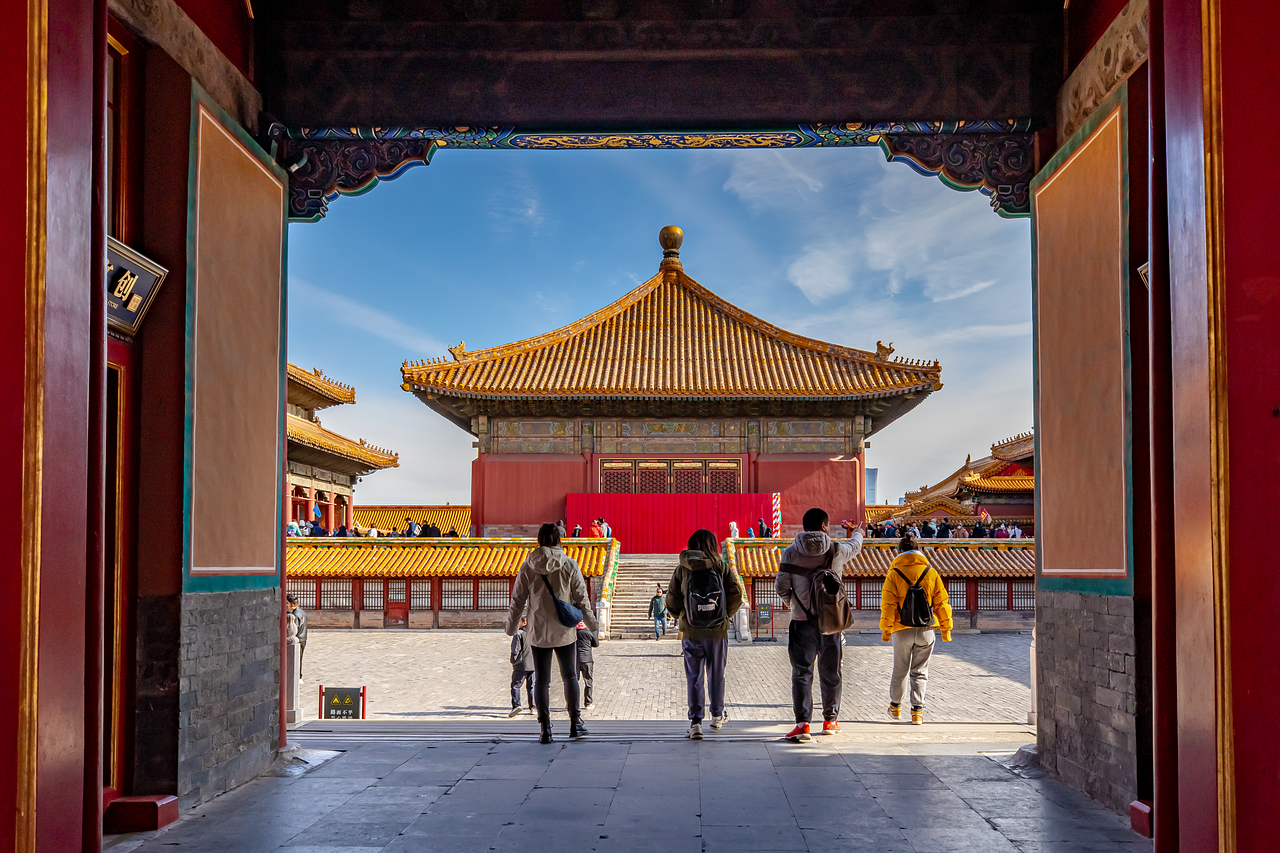
The Rise and Fall of Empires
The story of empires is a captivating tale woven with threads of ambition, power, and ultimately, decline. Throughout history, empires have risen to great heights, expanding their territories and influence, only to face inevitable downfall. This cyclical nature of empires is not merely a series of events; it is a complex interplay of various factors that shape their destinies. Understanding these factors can provide us with valuable insights into contemporary political structures and the lessons we can draw from the past.
At the heart of every empire's rise is a combination of military prowess, economic strength, and cultural influence. For instance, the Roman Empire, one of the most iconic empires in history, expanded its reach through a formidable military, establishing a vast network of roads that facilitated trade and communication. This not only boosted their economy but also allowed for the spread of Roman culture, law, and governance. Similarly, the British Empire leveraged its naval supremacy to dominate global trade routes, enriching itself and spreading its cultural influence worldwide.
However, the rise of empires is often accompanied by a series of challenges that can lead to their downfall. Factors such as economic instability, internal strife, and external pressures play a crucial role in this decline. For example, the fall of the Ottoman Empire was precipitated by a combination of economic difficulties, nationalist movements within its territories, and the pressures of World War I. As these empires expanded, they often overextended themselves, leading to vulnerabilities that could be exploited by rivals or internal factions.
To illustrate the rise and fall of empires, we can look at the following table that summarizes key empires and their trajectories:
| Empire | Period of Rise | Key Factors for Rise | Period of Fall | Key Factors for Fall |
|---|---|---|---|---|
| Roman Empire | 27 BC - AD 476 | Military conquest, trade expansion | AD 476 | Economic decline, barbarian invasions |
| British Empire | 1583 - 1947 | Naval dominance, industrial revolution | 1947 | World Wars, decolonization movements |
| Ottoman Empire | 1299 - 1922 | Strategic marriages, military conquests | 1922 | Nationalism, economic troubles |
As we analyze these empires, it becomes clear that the lessons learned from their rise and fall are not just historical footnotes; they are warnings and guides for contemporary governance. Modern political leaders can draw parallels between the past and present, recognizing that unchecked ambition can lead to overreach. The balance between expansion and sustainability is crucial. Empires that fail to adapt to changing circumstances often find themselves in a precarious position, facing both internal dissent and external threats.
In conclusion, the rise and fall of empires serve as a powerful reminder of the transient nature of power. While empires may dominate for a time, their legacies often linger long after their decline. By studying these historical patterns, we can better understand the dynamics of power today and the importance of adaptability in governance. After all, as the saying goes, "Those who cannot remember the past are condemned to repeat it." This echoes the importance of learning from history as we navigate the complexities of modern political landscapes.
- What are the main reasons empires rise? Empires typically rise due to military strength, economic prosperity, and cultural influence.
- What causes the decline of empires? Decline can result from economic instability, internal conflicts, and external pressures.
- Can modern governments learn from historical empires? Absolutely! Historical empires provide valuable lessons about the importance of adaptability and the dangers of overreach.

Implications for Modern Politics
Understanding the cyclical nature of history is not just an academic exercise; it has profound implications for modern politics. As we analyze past political transitions, we can glean insights that inform current governance strategies. For instance, recognizing patterns in historical cycles can help politicians and policymakers anticipate the potential rise and fall of political movements. This awareness can lead to more proactive governance rather than reactive measures, ultimately fostering stability within societies.
One of the most significant implications is the necessity for flexibility in political strategies. Just as empires have risen and fallen due to their inability to adapt to changing circumstances, modern political entities must remain agile. The failure to recognize the signs of impending change can lead to catastrophic consequences, as seen in numerous historical examples. For instance, the fall of the Roman Empire can be partly attributed to its rigid political structures, which failed to accommodate the diverse needs of its vast territories.
Moreover, the lessons from historical cycles emphasize the importance of public engagement and participation. Political transitions often stem from collective movements rather than the actions of a single leader. The recent surge in grassroots movements worldwide highlights a shift towards more inclusive governance. By understanding that history favors those who mobilize the masses, modern politicians can cultivate environments that encourage civic participation and foster democratic values.
Furthermore, the implications for modern politics also extend to the economic landscape. Historical materialism teaches us that economic structures play a crucial role in shaping political realities. As we face global challenges such as inequality and climate change, policymakers must consider the underlying economic factors that drive social unrest. By addressing these root causes, governments can create more equitable and sustainable political systems, ultimately leading to a more harmonious society.
Incorporating historical lessons into contemporary political discourse can also enhance the effectiveness of governance. For example, understanding the rise and fall of empires can guide modern leaders in crafting policies that promote resilience and adaptability. By analyzing the successes and failures of past regimes, current leaders can develop frameworks that not only respond to immediate challenges but also prepare for future uncertainties.
In conclusion, the implications of historical cycles for modern politics are vast and multifaceted. By embracing the lessons of the past, leaders can create more responsive, inclusive, and sustainable political environments. The journey through history is not merely a record of what has been; it is a guide that can illuminate the path forward. As we navigate the complexities of modern governance, let us remain vigilant and open to the teachings of history, ensuring that we do not repeat the mistakes of our predecessors.
- What are historical cycles? Historical cycles refer to the recurring patterns of rise and fall in political entities, often influenced by social, economic, and cultural factors.
- How can understanding history help modern politicians? By analyzing past political transitions, modern politicians can anticipate potential challenges and adapt their strategies accordingly.
- What role do grassroots movements play in political change? Grassroots movements are crucial for mobilizing public support and driving significant political transitions, often leading to more democratic governance.
- Why is economic structure important in political transitions? Economic structures influence social relations and power dynamics, which can either facilitate or hinder political change.
Frequently Asked Questions
- What is the philosophy of history?
The philosophy of history is a field that examines the fundamental nature and meaning of historical events. It seeks to understand how political transitions shape societies and influence governance over time. By exploring various philosophical theories, it provides insights into the patterns and principles that drive historical change.
- How does historical change occur?
Historical change is complex and multifaceted. It often results from a combination of social, economic, and political factors that interact over time. These can include shifts in power dynamics, cultural movements, and economic transformations. Understanding these elements helps us grasp why societies evolve and how political transitions take place.
- What are some key philosophical theories of history?
Key philosophical theories include determinism, which suggests that events are predetermined by prior conditions; idealism, which focuses on the role of ideas and consciousness; and materialism, which emphasizes the influence of economic and material conditions on historical development. Each theory offers a unique lens through which to analyze political evolution.
- What role do great individuals play in history?
Great individuals can significantly impact historical events, often acting as catalysts for political change. Their actions, ideologies, and leadership qualities can inspire movements and alter the course of history. However, it's essential to recognize that they are part of a broader social context that also influences outcomes.
- What is historical materialism?
Historical materialism is a theory that examines how economic structures and class relations shape political changes throughout history. It posits that material conditions, such as the means of production, play a crucial role in determining the social and political landscape, influencing everything from governance to social movements.
- What lessons can we learn from historical cycles?
Historical cycles reveal patterns of rise and fall, offering valuable lessons for contemporary governance. By studying past empires and political transitions, we can identify factors that contribute to success or decline, helping modern leaders anticipate challenges and make informed decisions for the future.
- How can understanding history inform modern politics?
Understanding history equips us with insights into the cyclical nature of political transitions. By recognizing patterns from the past, current leaders can devise strategies that navigate contemporary challenges, fostering stability and progress. This historical perspective can guide decision-making and policy formulation in today's complex political landscape.

